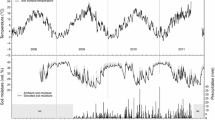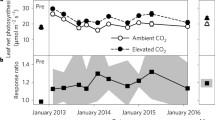Abstract
INCREASED forest growth in response to globally rising CO2 concentrations could provide an additional sink for the excess carbon added to the atmosphere from fossil fuels1,2. The response of trees to increased CO2, however, can be expected to be modified by the interactions of other environmental resources and stresses, higher-order ecological interactions and internal feedbacks inherent in the growth of large, perennial organisms3,4. To test whether short-term stimulation of tree growth by elevated CO2 can be sustained without inputs from other environmental resources, we grew yellow-poplar (Liriodendron tulipifera L.) saplings for most of three growing seasons with continuous exposure to ambient or elevated concentrations of atmospheric CO2. Despite a sustained increase in leaf-level photosynthesis and lower rates of foliar respiration in CO2-enriched trees, whole-plant carbon storage did not increase. The absence of a significant growth response is explained by changes in carbon allocation patterns, specifically a relative decrease in leaf production and an increase in fine root production. Although these compensatory responses reduced the potential increase in carbon storage in increased CO2 concentrations, they also favour the efficient use of resources over the longer term.
Similar content being viewed by others
References
Tans, P. P., Fung, I. Y. & Takahashi, T. Science 247, 1431–1438 (1990).
Post, W. M. et al. Am. Sci. 78, 310–326 (1990).
Bazzaz, F. A. A. Rev. Ecol. Syst. 21, 167–196 (1990).
Norby, R. J. & O'Neill, E. G. New Phytol. 117, 515–528 (1991).
Wullschleger, S. D., Norby, R. J. & Gunderson, C. A. New Phytol. (in the press).
Waring, R. H. & Schlesinger, W. H. Forest Ecosystems: Concepts and Management (Academic, Orlando, Florida, 1985).
Eamus, D. & Jarvis, P. G. Adv. ecol. Res. 19, 1–55 (1989).
Harris, W. F., Sollins, P., Edwards, N. T., Dinger, B. E. & Shugart, H. H. in Productivity of World Ecosystems (Symp. Proc. International Biological Program, Seattle, 31 August–1 September 1972) 116–122 (Natn. Acad. Sci., Washington DC, 1975).
Idso, S. B. Bull. Am. meterol. Soc. 72, 962–965 (1991).
Author information
Authors and Affiliations
Rights and permissions
About this article
Cite this article
Norby, R., Gunderson, C., Wullschleger, S. et al. Productivity and compensatory responses of yellow-poplar trees in elevated C02. Nature 357, 322–324 (1992). https://doi.org/10.1038/357322a0
Received:
Accepted:
Issue Date:
DOI: https://doi.org/10.1038/357322a0
- Springer Nature Limited
This article is cited by
-
Decadal biomass increment in early secondary succession woody ecosystems is increased by CO2 enrichment
Nature Communications (2019)
-
The plasticity of the growth and proliferation of wheat root system under elevated CO2
Plant and Soil (2014)
-
Beyond global change: lessons from 25 years of CO2 research
Oecologia (2013)
-
Root-zone CO2 and root-zone temperature effects on photosynthesis and nitrogen metabolism of aeroponically grown lettuce (Lactuca sativa L.) in the tropics
Photosynthetica (2013)
-
Response of Norway spruce root system to elevated atmospheric CO2 concentration
Acta Physiologiae Plantarum (2013)





